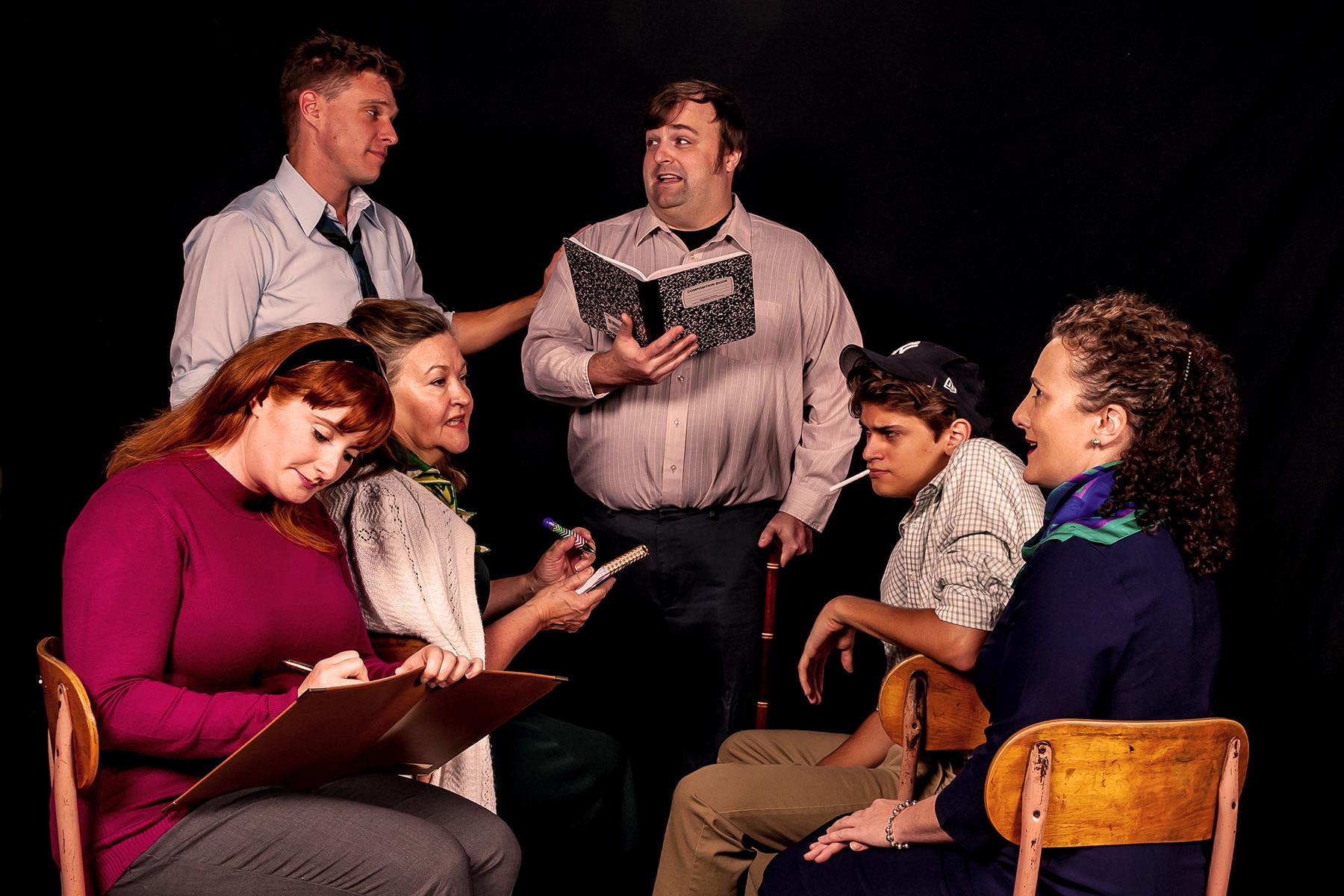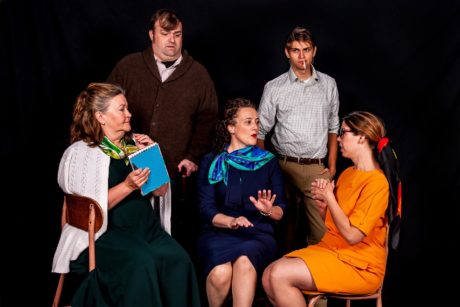Colonial Players’ production of The Babylon Line is an engaging drama that raises many questions about memory and writing. Written by Richard Greenberg and first performed in 2016, it focuses on a writer living in Greenwich Village who teaches an adult creative writing class in Levittown in 1967, and the six students who take his course. This version, directed by Jennifer Cooper, combines great acting and directing with creative lighting and staging to tell a powerful story.

Ron Giddings plays Aaron, the writer and teacher, with a bitter world-weariness, as well as a disdain towards his students. He begins and ends the play an old man, stooped over, arms wrapped around himself, telling this story from the present day because what happened in 1967 feels so important to him. He had a piece published in a literary magazine years earlier, but nothing else since, and he goes on the offensive when his student Joan (Robin Schwartz) keeps offering theories as to why he is blocked; he prefers to call it being “patient.” Running into a more successful writer acquaintance (Jack Leitess) on the train back to New York (on the Babylon Line of the title), he dismisses Levittown and his students as provincial, suburban clods, while inwardly scorning his friend’s recent novel.
Robin Schwartz gives a passionate intensity to Joan. When she reads from her work, it is a full performance, pacing around the stage, acting out her poetic, vaguely autobiographical stories. She brings this same feeling to her relationship with Aaron, begging him at first to help her overcome her fears and begin writing. She and Giddings slowly build a connection, bonding over their discussion of literature and feelings of alienation from Levittown society. Enamored of her stories, he defends it from other students’ criticisms. Before long, it’s clear she wants more from him than just writing advice, and the two sizzle together as they step right up to that possibility. Schwartz gives the most emotional performance of the show, overflowing with dreams and desires.
Alicia Sweeney brings a cold, calm outspokenness to Frieda, delivering her cutting witticisms with excellent comic timing. Commenting on fellow student Jack (Jeff Sprague)’s story about his time in the Korean War, which he tells the class twice, she says, after much silence, “it was very moving,” and he doesn’t have to tell the story “ever again.” She challenges Aaron’s teaching methods, or lack of, and his taste in literature. Only once does she lose her composure, running out at the end of Joan’s first story, after asking her if she was “making insinuations”; by the end, we find out why it affected her.
Mary MacLeod and Lindsey Miller play Frieda’s friends Anna and Midge. MacLeod reads from her travel story, full of clichéd observations, and angrily rebuffs Frieda when she asks, “where’s the hatred?” Miller reads an amusing story of her encounter with Levittown’s founder, then tells a chilling story of trying to burn “subversive” books. Jeff Sprague plays Jack with hidden depths, revealed in a story about a crazy party he attends. Sprague plays another character towards the end, very different from Jack who connects several of the students. Jack Leitess gives a rebellious quality to Marc, the youngest character, holding a cigarette throughout class and throwing his legs up on the desk. When he finally reads from his “magnum opus” the confusion and desperation are clear on his face. He also plays minor characters, such as Joan’s angry, fearful husband, with great passion.
Lois Banscher and Nick Beschen have done great jobs as Properties Designer and Set Designer, creating a classroom. In the first act, a large desk sits on the far right of the stage, with a globe on top; a chair and trash can are nearby. Smaller student desks and chairs are on the sides of the stage facing the teacher’s desk. In the second act, they all move to the left side. Notebooks and pencils are on the desks.
Costume Designer Beth Starnes has created outfits that distinguish each character. Aaron begins and ends the play wearing a beige rain jacket and dark blue fedora, in between wearing a light blue dress shirt, khaki pants, and tie nearly pulled off. Frieda has on a dark blue long dress, and a blue scarf with a gold clasp. Anna wears a long green dress with a white sweater and a green scarf. Midge has a long light orange dress, while Jack has blue pants, a light brown sweater vest, and carries a cane. Marc stands out in blue jeans, denim jacket, and baseball cap, while Joan is distinguished in her gray pants and pink sweater. When playing other characters, they put on fedoras or scarves. In one case, Jack changes into a tie-dye T-shirt and red bandana.

John Purnell uses inventive lighting as Lighting Designer. When Aaron speaks directly to the audience, the lights turn low, almost in complete darkness. When Jack tells his war story, red lights pulse throughout. When Aaron rides the train, white lights mimic moving fluorescent bulbs. As Joan reads from her work, the lights dim, spotlighting her. Sound Designer David Cooper helps capture the feel of the era by playing period music, although at times it makes dialogue difficult to hear, especially when the actors’ backs are to the audience.
Jennifer Cooper has done a wonderful job as Director. The actors navigate the stage and each other with ease. They adopt the other characters quickly and easily, throwing on the different outfits as needed. While the ending drags on longer than seems necessary, the show is still enthralling, and leaves audiences thinking about it long afterward. It’s well worth watching!
Running Time: Approximately 2 hours and 45 minutes, with a 20-minute intermission.
The Babylon Line plays through November 10, 2018, at Colonial Players of Annapolis – 108 East Street in Annapolis, MD. For tickets, call the box office at 410-268-7373 or purchase them online.




